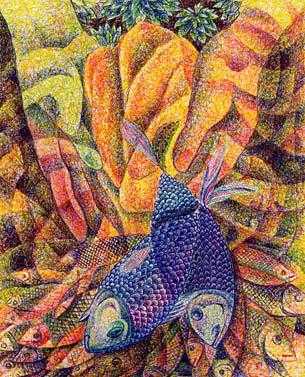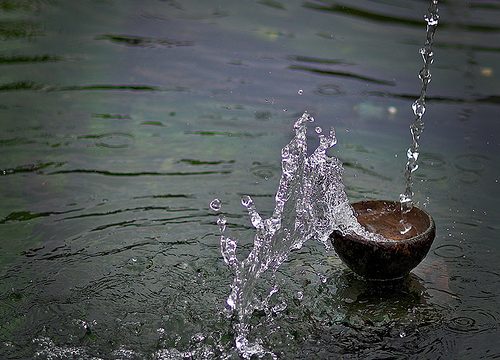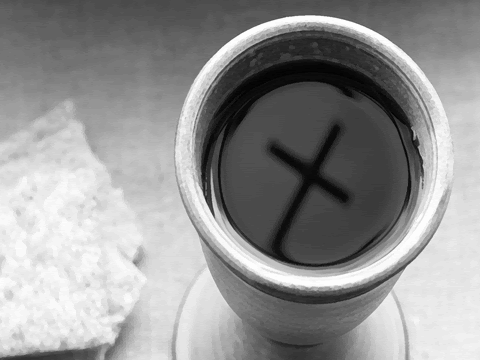Lenten Reflection Day 25 (Mar 18): THIRST (from John 4:5-42).
SONG: All Who Are Thirsty by Vineyard Music: https://youtu.be/K71EYID22l4
POEM: Jane Hirshfield: A Well Runs Out of Thirst (excerpt): A well runs out of thirst the way time runs out of a week, the way a country runs out of its alphabet or a tree runs out of its height … A person comes into the kitchen to dry the hands, the face, to stand on the lip of a question.
QUOTE: Rev Dr Martin Luther King Jr.: Let us not seek to satisfy our thirst for freedom by drinking from the cup of bitterness and hatred.
June 27 Worship
Lenten Devotional – Thurs, Mar 11: FILLED
As he talked to the people of his time, Jesus used imagery that helped them identify with the conditions of humanity: those who would receive the blessing. Hunger. Thirst. The same metaphors translate well for modern folks.
We understand such deep and essential needs. Authors of the Jamieson-Fausset-Brown Biblical commentaries write about this Beatitude by including it among the three earlier ones that addressed being poor in spirit, mournful, and meek. These scholars say that those who receive the first four blessings are “conscious of their need of salvation” and that they do not yet act as if they are “possessed of it.”
They’re metaphorically empty. And they know it. And somehow, this need or ‘lack’ is always creating space for the presence of God in their lives. Our lives. Remember, this blessing extends down through generations to embrace us, too.
Folks who are about to be ‘filled’ are among those in the early stages of the twelve-step recovery model: a helpful way to compare the journey through the Beatitudes. They’re in need. They’ve admitted to that need. They’ve named the nature of their issues and challenges. They have handed over their lives and wellbeing to redemptive relationships, such as Godself. They long for help. If they identify as Christians, they have turned themselves toward God — their source of a holistic wellspring — for that help.
If we’re longing for a healthy and sustainable relationship with Godself, mirrored in our self-care and ethical connections to other people, then the answer to our desire is to experience a wholeness of connection that satisfies what seems missing in our lives. That’s what being ‘filled’ means. That’s the blessing.
It’s an easy metaphor to understand. Harder to live out.
Think of this desire as life-threatening. As vital as lack of food or water would be.
You need to be filled. Fulfilled. The promise of the Beatitude is that the need is met. More than met, by forming a relationship with Godself.
Our desire to be in relationship with God, when fulfilled, is satisfied in such a way that it may remain sated. It continually renews wellbeing. We’ll probably have relapses. Bumps along the way.
Yet our holistic connection to God restores equilibrium. In such conditions, we can care for ourselves and others, because we are anchored in a bond with Godself.
Of course, the human experience, named at the start of the blessing, is that we’re constantly wanting. We start out empty: devouring and processing whatever we can imbibe. In a sense, that’s how we learn.
Even if we want good, healthy, ethical conditions and outcomes and connections, we’re on the empty end of the equation, wishing for fulfillment. And we’re perpetually out of balance, we cannot stand alone: we need to be in relationship.
Simply wanting to be connected to God turns us in a life-affirming direction. It won’t be easy or absolute. The state of reaching toward God, as God leans close to meet us where we are, remains part of our journey. Apparently, we must exercise the option to say yes, over and over.
While we’re always invited to belong to God, the choice remains ours. The opportunity to say yes — or not — is within our power. So the only one who gets in the way of the relationship with God is us and our human experience.
God always draws close. Pursues us. Never backs down. Never gives up. Always shows up. And that presence … that’s what fulfills. And fills. — Rev Gail
MEDITATIONS:
Open your eyes, look within. Are you satisfied with the life you’re living? — Bob Marley
Man is the only animal whose desires increase as they are fed; the only animal that is never satisfied. — Henry George
To be satisfied with a little, is the greatest wisdom; and he that increaseth his riches, increaseth his cares; but a contented mind is a hidden treasure, and trouble findeth it not. — Akhenaton
You must accept that you might fail; then, if you do your best and still don’t win, at least you can be satisfied that you’ve tried. If you don’t accept failure as a possibility, you don’t set high goals, you don’t branch out, you don’t try – you don’t take the risk. — Rosalynn Carter
God is most glorified in us when we are most satisfied in Him. — John Piper
Challenge or Question: When do you feel that you are enough? How does that reflect on your connection to Godself? What gifts have you received that allow you to experience that feeling of contentment, fulfillment, satisfaction, and being enough?
Lenten Devotional – Tue, Mar 9: THIRSTY
Tue, Mar 9: THIRSTY
When Matthew addresses hunger and thirst, we can consider them as intertwined appetites of body, mind, and spirit. Our thirst begins deep inside, born among the gaps and absences, hurts and shortcomings. Something is missing. We feel empty — or perhaps incomplete — and long to be filled.
Spiritually, we’re thirsting for a more life-giving and essential connection, healing, and relationship. It often arises as a sense of longing, questioning, or restlessness, to which Christ speaks in this Beatitude. It also echoes the long narrative thread of water in Biblical stories.
Of course, Christ is called the Water of Life. Truly, the sacred element of water, especially in desert settings, is not just symbolic: it is crucial to thriving.
We can trace the stories of water from Hebrew scriptures to the Gospels and letters of Paul. It begins with the creation story of the waters covering the face of the earth, arises in the the great flood and covenant with Noah, and flows in the river that carried baby Moses away from Miriam to the Egyptian princess that raised him, rolls back as the famed parting of the Red Sea for the fleeing Israelites, the springs forth as the fountain of water when Moses struck the rock with his staff. It returns in stories of the wells and rivers and oases that nourished flocks and shepherds and whole tribes. It is the backdrop for the tale of Jonah and the fish and a gathering place in distance lands around which the exiled Israelites gathered and wept. Among the stories of Jesus are those that include being baptized by John in the Jordan, asking for water from the woman at the well, transforming water into wine at the wedding, calming stormy waters, walking on the water, washing the feet of his followers, and weeping as he died on the cross. Then again, water becomes crucial in the apostolic tales of baptizing new believers such as Lydia or traveling across the seas to new cities and faith communities.
How do we trace the story of thirst, and life-giving responses we have experienced, in our own lives?
Always, thirst suggests a vital need within us: in this case it is for more than the survival of our bodies. Jacques Phillipe writes, ‘The fourth Beatitude points to a question; what is my deepest desire? Hunger and thirst are images for what is most essential … What desire is the principle of unity in my life?’
Sometimes, mistakenly, we reach for easy comforts that sate and distract. Ones that cannot meet our deepest need. As humans, we often take shortcuts to satisfy underlying emotional, psychological, spiritual needs and thirsts.
In part, this Beatitude addresses the honesty of accounting for the ways we are harmful to ourselves and others as we search for Godself. We make mistakes by quenching lesser and unhealthy cravings along the way. They get between us and a healthy relationship with ourselves, other people, and Godself.
In twelve-step models, this parallels taking inventory of our moral issues. Christ blesses those who acknowledge their hungers and thirsts — their addictions and desires and habits — and then re-direct themselves, striving for satisfaction in healthy and holy ways.
These forms of inventory, and seeking right relationship, can also occur at societal levels. Certainly the focus on relationship suggests community as part of the response as well as the source of the trouble. Jacques Phillipe observes, ‘Hunger and thirst for justice, desire for the Kingdom, far from being passive waiting, are actively expressed in announcing the good news of the gospel and the work of transforming society to which each of us is called.’
Our desires may be met and filled by a focused connection to Godself and a supportive community. Yet simply to realize that we have such a need is an important step along the Way of Christ. Revealing these vulnerable, imperfect aspects of our being and our society can lead to healing: reinforcing personal and communal practices that support wellbeing.
This process doesn’t promise to be easy. Yet the Beatitude assures us that we will be filled. All the gaps and fissures, the broken places, the emptiness and isolation, will be topped off. God’s abundance overflows. We are renewed through relationships with creation, other people, and with Godself. — Rev Gail
Animals praise a good day, a good hunt. They praise rain if they’re thirsty. That’s prayer. They don’t live an unconscious life, they simply have no language to talk about these things. But they are grateful for the good things that come along. — Mary Oliver
When you’re thirsty and it seems that you could drink the entire ocean, that’s faith; when you start to drink and finish only a glass or two, that’s science. — Anton Chekhov
It’s a great responsibility before God, the judge who guides us, who draws us to truth and good, and in this sense the church must unmask evil, rendering present the goodness of God, rendering present his truth, the truly infinite for which we are thirsty. — Pope Benedict XVI
Challenge or Question: In what ways do you feel empty? When does this emptiness seem healthy and when is it a problem? What fills the emptiness or ‘lack’ for you?
Sermon: Thirst
JCC 100117 – Thirst from architect on Vimeo.


